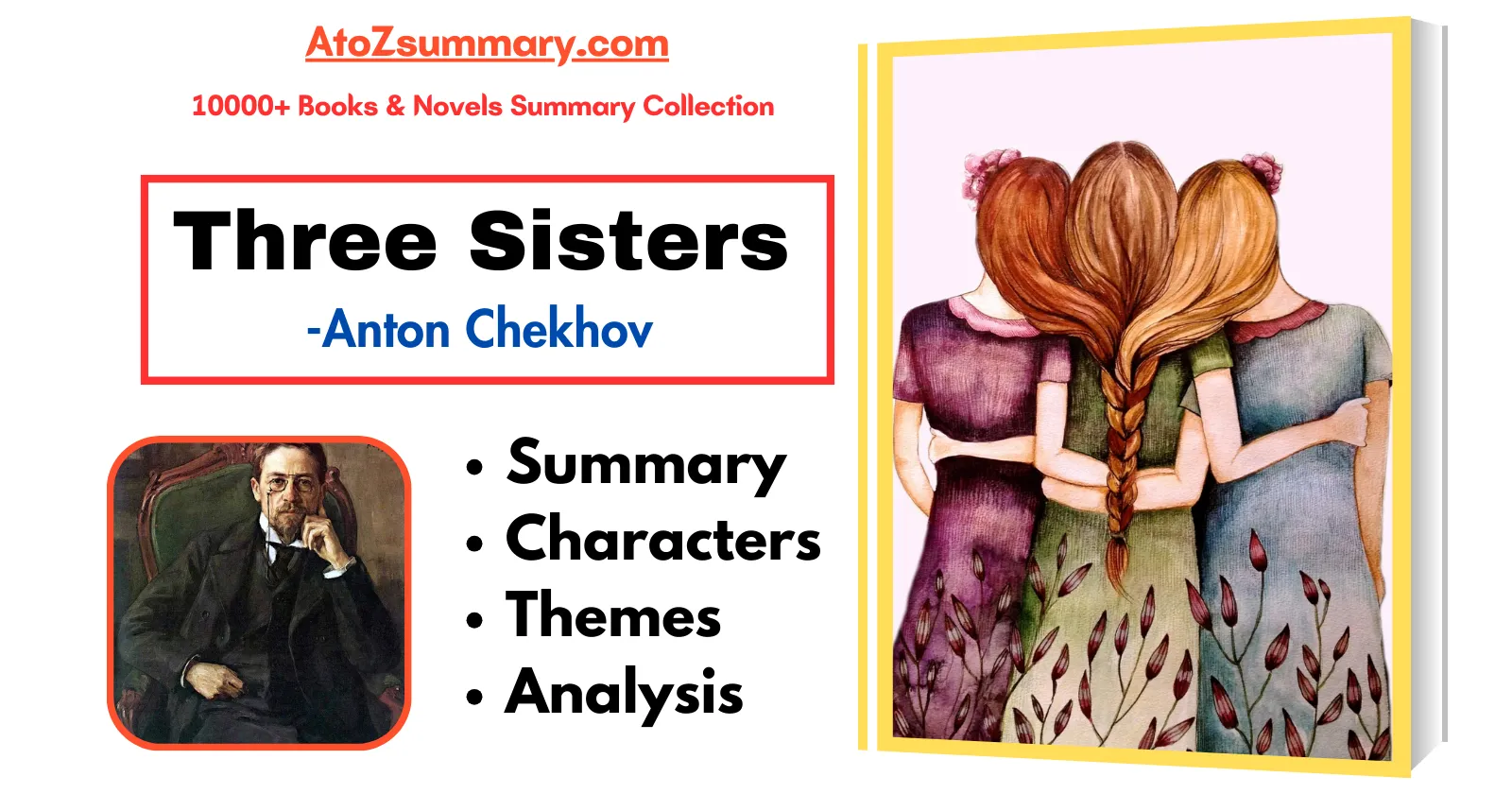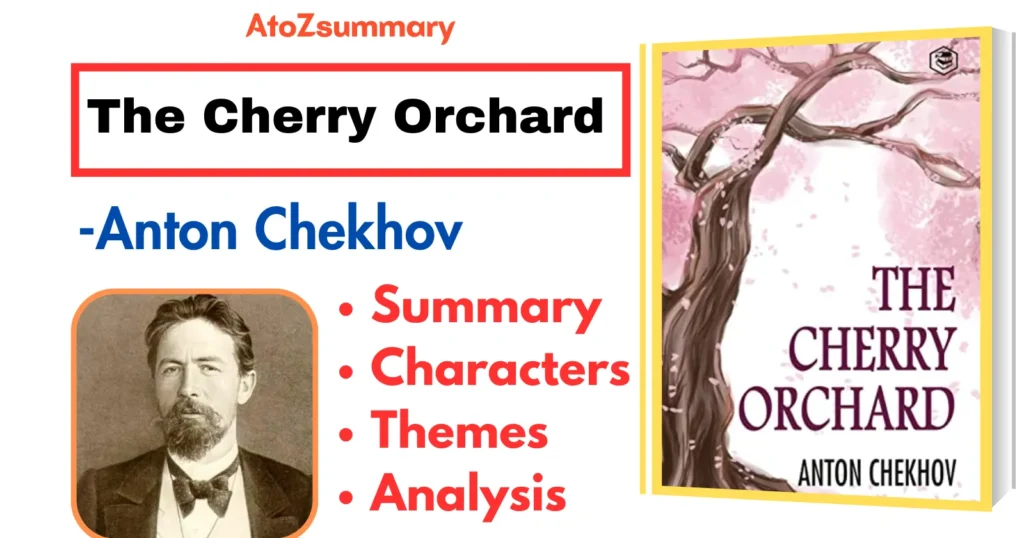Analysis
| English Title | Three Sisters |
| Original Title | Три сестры |
| Author | Anton Chekhov |
| Genre | Drama |
| Setting | A provincial town in Russia, in the late 19th century |
| Date of First Performance | 1901 |
| Style | Realistic, Chekhov’s signature blend of comedy and drama |
| Structure | Four Acts, Multiple Scenes |
| Key Motifs | – The Clock (Symbolizing Time) – The Cherry Orchard (Symbolic Setting) |
Three Sisters by Anton Chekhov is a classic play that explores the lives of three sisters—Olga, Masha, and Irina—as they yearn for a more fulfilling existence in a provincial Russian town. The play delves into themes of longing, disillusionment, and the passage of time. Chekhov skillfully portrays the characters’ inner struggles and their inability to achieve their dreams. The play is known for its poignant portrayal of the human condition and the bittersweet nature of unfulfilled aspirations.
Characters
The characters of “Three Sisters” by Anton Chekhov are:
- Olga Prozorova: Olga is the oldest sister. She’s like the responsible big sister, always trying to keep everything together. She works as a teacher and has a nurturing personality.
- Masha Prozorova: Masha is the middle sister. She’s kind of moody and wears black a lot. Masha is married to a guy she doesn’t really love, and she finds solace in a secret relationship.
- Irina Prozorova: Irina is the youngest sister. She’s optimistic and dreams of a better life in Moscow. She starts working at the local telegraph office, hoping for a more exciting future.
- Andrei Prozorov: Andrei is the brother of the sisters. He starts off full of ambition but faces challenges in his career and personal life.
- Natasha Ivanovna: Natasha is Andrei’s wife. She comes into the family and changes the dynamic. She is ambitious and wants to improve her social status.
- Chebutykin: Chebutykin is a doctor and a friend of the family. He has a tragic past and uses alcohol to cope.
- Vershinin: Vershinin is an officer. He’s married but has a difficult relationship. He becomes friends with the sisters and represents the theme of hope in the play.
- Kulygin: Kulygin is Masha’s husband. He’s a teacher and is a bit awkward. His marriage with Masha is strained.
Themes
The themes of “Three Sisters” by Anton Chekhov are:
- Yearning for a Better Life: The characters in “Three Sisters” express a deep desire for a more fulfilling and meaningful existence, often feeling trapped in their current circumstances.
- Loss and Regret: The play explores the theme of missed opportunities and the melancholy of unfulfilled dreams, as the characters grapple with the passage of time and the choices they’ve made.
- Search for Identity: The sisters strive to understand themselves and find their place in the world amidst societal changes. They confront questions about who they are and what gives their lives purpose.
- Frustration and Discontent: The characters experience frustration with their present situations and a sense of discontentment, highlighting the challenges of finding happiness and satisfaction in life.
- Time and Change: “Three Sisters” reflects on the inexorable passage of time and the impact of societal changes on individuals. The characters grapple with adapting to a world that is evolving around them.
- Isolation and Loneliness: Despite being surrounded by people, the characters often experience a profound sense of isolation and loneliness, emphasizing the difficulty of forming genuine connections in a changing society.
Watch Full Play Summary of “Three Sisters”
Summary
The play Three Sisters (1900) by Russian novelist and dramatist Anton Chekhov was initially presented at the Moscow Art Theatre in 1901. It is occasionally cited as one of Chekhov’s best plays.
In Act 1: The oldest sister, Olga, gets employed as a teacher. She has been elevated to headmistress by the play’s conclusion, although she shows little enthusiasm for the position. The family artist and middle sister, Masha, is wed to educator Feodor Ilyich Kulygin. Masha used to find him fascinating and believed he was intelligent and mature, but after seven years she starts to think he’s just plain old boring.
The youngest sister, Irina, nevertheless exudes a sense of youthful optimism. She discusses her desire to visit Moscow and find her true love. The sisters were born and raised in Moscow, and they all yearn to go back there. The girls hold Andrei in high regard as he is the only brother. Natalia Ivanovna, sometimes known as Natasha, is his primary love interest and is somewhat more prevalent than the Prozorov family.
It is also Irina’s birthday and the first anniversary of the father of the Prozorov siblings passing away. Because of this, Vershinin, the brave commander of the soldiers, and everyone else join her in celebrating. This fosters a notion of lofty idealism. In the closing moments, Andrei asks Natasha to marry him after privately confessing his love for her.
In Act 2: After being together for almost twenty-one months, Andrei and Natasha welcomed their first child, a boy called Bobik, into the world. Natasha is having an extramarital affair with Protopopov, Andrei’s boss. He never appears on a stage. Masha returns home feeling red-faced from their night out, having a hidden romantic relationship with Lieutenant-Colonel Vershinin. As Natasha forbids organizing events or gatherings, the eerie silence implies that all joy is being extinguished. Both Solyony and Tezenbach profess their love for Irina.
In Act 3: About a year later, it is evident that Natasha is taking over the home in many ways. To provide her kid with a room of his own, Natasha forced Olga and Irina to share a room. The community is in a dangerous condition due to a terrible fire. Running in and out of the room, others are bringing clothing and blankets to assist. Andrei’s sisters are upset with him since he has been hoarding money for himself to pay off his gambling debts, in addition to mortgaging their house and giving his wife excessive control.
By threatening to throw Anfisa, an elderly family retainer, out of the house, Natasha acts harshly towards her. Olga allows Anfisa to reside in her teacher’s apartment and makes an unsuccessful attempt to confront Natasha. Masha confides in her sisters about her secret infatuation with Vershinin. Masha leaves the room at one point as her husband wanders in. Irina feels as though her life has become ordinary and she has forgotten much of her former experiences and knowledge.
Although it is the sensible thing to do, Irina, who is disappointed in life, chooses to accept Tuzenbach’s proposal even if she doesn’t love him. Olga supports this sensible decision. Chebutykin, the once-entertaining and colorful army doctor who adored Irina’s mother, is going through an existential crisis. He shatters the late mother’s clock intoxicatedly. Andrei has an epiphany and acknowledges his stupid actions. He lets out his self-loathing and asks his sisters to pardon him for entrusting Natasha with his authority and trust.
In Act 4: The family’s pals, the troops, are ready to part ways. There is tension in the air as Tuzenbach is trying to conceal Solyony’s challenge to a battle from Irina. Irina admits that she does not and cannot love him during their brief moment of secret intimacy. She compares her emotions to a piano with a misplaced key in this passage. Tuzenbach is slain by a gunshot that the troops hear just before they depart. Masha is welcomed back into her spouse’s embrace. Olga is considered an old maid, yet she has accepted the position of headmistress. When she moves out, Anfisa will go with her.
Despite her sadness about Tuzenbach, Irina wants to go on teaching. Her prospects are unclear. Natasha continues to be the force behind everything. Andrei, who now has two kids, is locked in an unpleasant marriage. At the play’s conclusion, the three sisters give each other an embrace and observe the troops leaving to the sound of marching drums. Olga longs for an end to the chaos they are all experiencing as Chebutykin sings a song to himself.
FAQs
What is the story of three sisters about?
What is the message of the three sisters?
Amidst the unfulfilled dreams and longing for a better life, the sisters’ message is to cherish the present and find joy in the small moments.
What do the three sisters symbolize?
In Chekhov’s play, the three sisters symbolize unfulfilled dreams and longings for a life beyond their provincial existence.
Who is solyony in the three sisters?
Solyony is a staff captain in the army and a regular visitor to the Prozorov household







![The Catcher In The Rye Summary, Themes & Characters [by J. D. Salinger] The Catcher In The Rye Summary, Themes & Characters [by J. D. Salinger]](https://atozsummary.com/wp-content/uploads/2023/06/The-Catcher-In-The-Rye-Summary-Themes-Characters-by-J.-D.-Salinger.webp)



